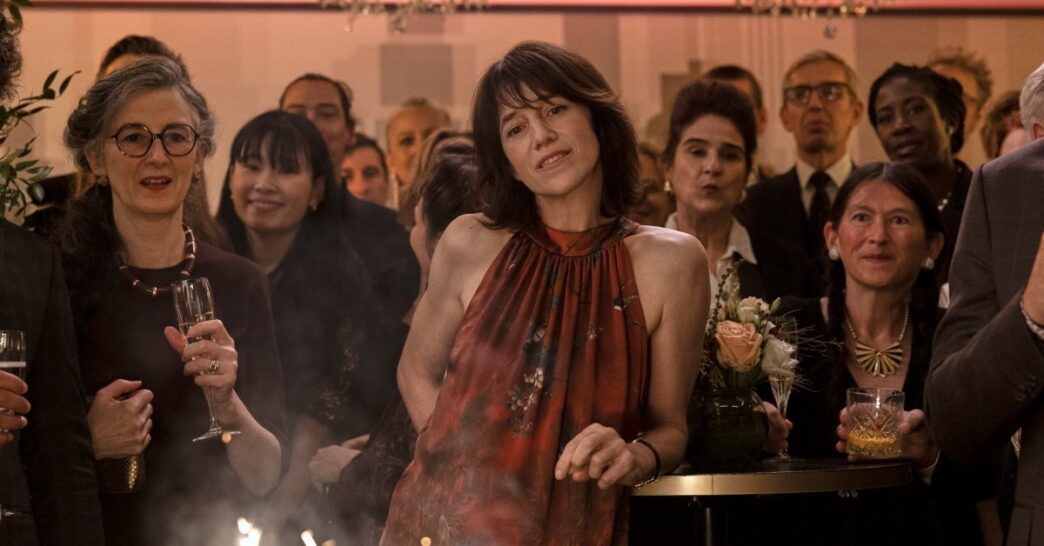Midway through the first season of Étoile, a lavish dramedy set in the realm of elite professional ballet, the greatest and most volatile dancer in the world uses her curtain call to address the audience. “Ladies and gentlemen, the arts are dying,” Cheyenne Toussaint (Lou de Laâge) announces. “And when art dies, so does humanity. This world is a hellhole. We have nothing to promise the next generation.” Her speech crescendoes into a condemnation of Crispin Shamblee (Simon Callow), the eccentric billionaire who funds Cheyenne’s cash-strapped company—and whose amoral enterprises have just caused an environmental disaster.
You know you’re living in tumultuous times when even the biggest names in comfort TV feel compelled to get topical. Premiering April 24 on Prime Video (yes, the streaming platform owned by the second-richest person on the planet), Étoile is the latest project from Gilmore Girls and The Marvelous Mrs. Maisel creator Amy Sherman-Palladino and her husband and frequent collaborator, Daniel Palladino. Sherman-Palladino is known for making chatty, witty, compulsively referential, female-focused shows that take a special interest in the arts; she previously spotlighted ballet in her short-lived but beloved series Bunheads. The voice behind all of the above titles is certainly recognizable in Étoile. But the show also represents a novel attempt to marry escapism with engagement. It’s just one of the many ambitious juxtapositions that make this vindication of high art in a world on fire as fascinating—and fun—as it is messy.

Étoile is, in fact, premised on one such unexpected pairing. Set in our post-pandemic present, as performing arts institutions that had been in precarious financial straits for decades scramble to get butts back in seats, the show opens with a radical plan to boost ticket sales: Two ballet companies (one clearly based on the New York City Ballet and the other on the Paris Opera Ballet) embark upon an unprecedented talent swap. The scheme is described as a “transatlantic pas de deux.” And the pas de deux turns out to be the central metaphor of a series built on dualities, power struggles, romances, the attraction of opposites, the narcissism of small differences that divide counterparts on either side of an ocean. Individual genius battles group harmony. Art is in a dance-off with commerce; pragmatism, with purity; and perfection, with survival.
The story unfolds simultaneously in New York and Paris, English and French, among ensembles led by the two companies’ directors. Jack McMillan (Luke Kirby, who played Lenny Bruce in Maisel), of the Metropolitan Ballet Theater, is a scion of old money who bustles around Lincoln Center navigating bad reviews, complaints about staff misconduct, and the persistent problem of patrons pilfering champagne flutes. France offers more systemic support for its arts institutions, but Le Ballet National head Geneviève Lavigne (Charlotte Gainsbourg) is in a probationary position, subject to the harsh scrutiny of a powerful board. Both leaders tend to put their feet in their mouths. And, in a perhaps-unnecessary tension builder, they have a history of hooking up.

Among the talent trading places, Cheyenne is at once the most iconic and, thanks in large part to De Laâge’s awards-worthy performance of seething intensity, the most captivating. She arrives in New York nearly feral, plowing through dance partners she dismisses as hopelessly mediocre while doubting that she has much left to give to her art. “I want to fight,” she says in the premiere. “I want something to matter.” But maybe that something isn’t ballet. Maybe it’s out there in that “hellhole” of a real world. She meets her match in Crispin, a cheerfully, unctuously evil, ballet-loving businessman who sees her and himself as equally “uncompromising.” The comparison horrifies Cheyenne. (She isn’t his only critic. Jack calls Crispin a “right-wing, boot-licking toadie for dictators.”) While Callow provides some hilarious comic relief, devising elaborate ruses to evade constant kidnapping and assassination attempts, Crispin also anchors the show to the dilemma facing so many real arts organizations: accept funding from morally compromised billionaires (see: the Sacklers) or stay pure and, maybe, cease to exist.
Cheyenne is hardly the sole diva involved in the exchange. Étoile’s initially unwieldy ensemble also includes Tobias Bell (Maisel’s Gideon Glick), a fragile, neurotic American choreographer whose unorthodox style challenges tradition-loving French audiences. He’s paired, in dance and as a love interest, with a belligerent Parisian principal, Gabin Roux (Ivan du Pontavice). Also journeying across the Atlantic is Mishi (genuine ballerina Taïs Vinolo), a young, naive French dancer who became a star in New York after Geneviève rejected her from Le Ballet National. She arrives in Paris decked out in NYC merch and clutching a plush bagel with schmear, none too excited for a homecoming that will deliver her back to self-involved parents whose influence within the French performing arts scene leaves her open to nepo-baby accusations.

Étoile has all the elements of a classic Sherman-Palladino joint, which is to say that it’s a pleasure to watch. The dialogue is punchy. Cultural references abound; a Greta Thunberg-esque climate activist appears on the news threatening to protest Le Ballet National alongside Mark Ruffalo and Björk (Geneviève: “Not Björk!”). Familiar faces from the Sherman-Palladino sphere, like Gilmore Girls alums Yanic Truesdale as Geneviève’s deputy and Kelly Bishop in the extremely Emily-Gilmore-coded role of Jack’s mom, keep popping up. Perhaps best known in the U.S. for starring in some of Lars von Trier’s most harrowing films, Gainsbourg may not have been the obvious choice to play a nervous chatterbox. But the actress, singer, and daughter of French pop legend Serge Gainsbourg is great here, simultaneously elegant and flustered. The creators’ love of ballet comes through, as it did in Bunheads, in closeups of company members bandaging their battered feet and generous dance sequences. Cheyenne’s curtain-call speech is preceded by approximately 15 minutes of nearly uninterrupted dancing—the kind of flex it’s hard to imagine anyone besides Sherman-Palladino getting away with amid the short-attention-span streaming mandates of 2025.
There’s no question that the show is overstuffed. With such a big cast and so many storylines, it’s easy to lose track of characters, like the Met’s veteran artistic director, Nicholas, (David Haig), who don’t have much to do until late in the season. A self-taught preteen dancer, Susu (LaMay Zhang), whose mother, a cleaner at the studio, sneaks her in to practice at night could have served as an inspired connection to the next generation of ballerinas. As written, though, she’s essentially a vehicle to reveal a nurturing side of Cheyenne that she rarely shows adults. The conventional wisdom that artists are a handful yields a singular character in Cheyenne but also some clichéd caricatures. A few of the series’ too many love connections lack chemistry or otherwise come off as obligatory box-checking. Sometimes the pas de deux between light showbiz dramedy and weightier themes, from the existential threats facing the arts community to the imminence of extinction-level environmental catastrophes, can feel disproportionate.
But it’s hard to complain too much about an inconsistent tone when the rhythms of real life have become jarring in similar ways. One minute you’re overthinking a TV show; the next, you’re reckoning with the repercussions of the proposed deportation of U.S. citizens. In such unstable times, Cheyenne (and, speaking through her, the Sherman-Palladinos) is right to remind us that art matters because it represents the human race at its very best. Étoile doesn’t just make that argument, in guest appearances by artists who bridge high and low, like David Byrne, and shouting out the brilliant documentarian Frederick Wiseman in a scene set at the Manhattan cinema mecca Film Forum. It also stands as a delightful, if occasionally chaotic, case in point.














